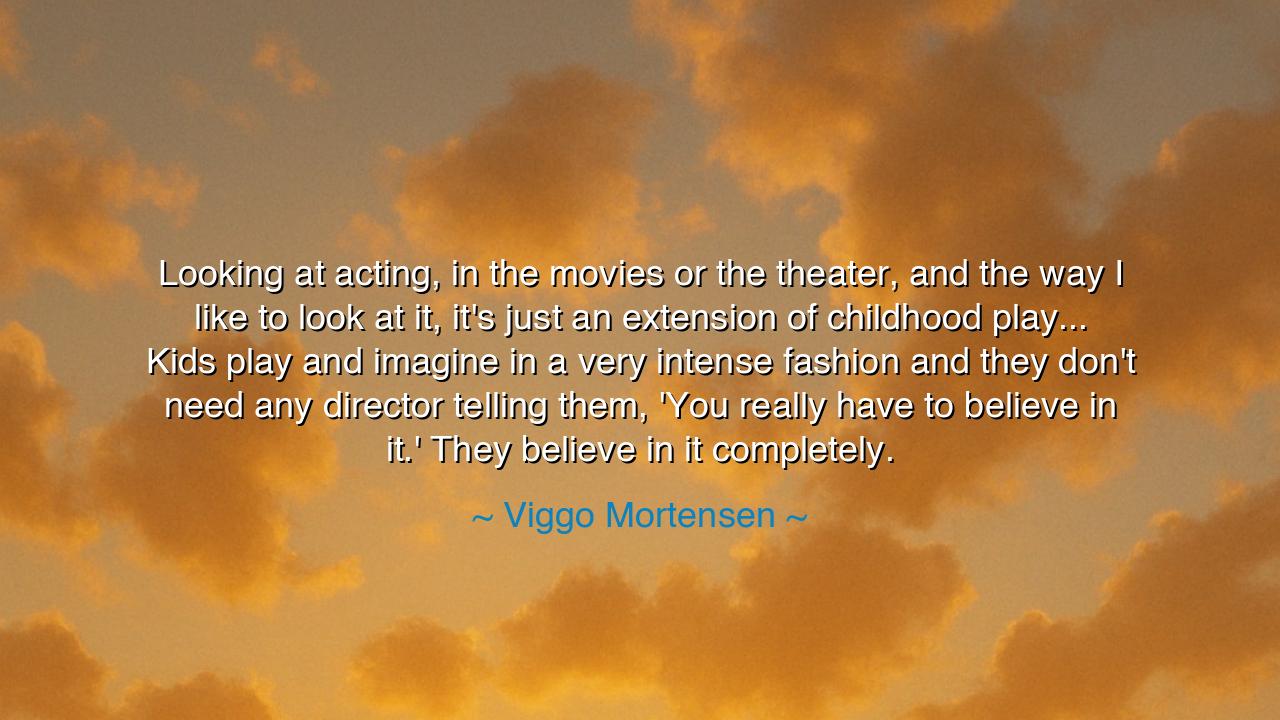
Looking at acting, in the movies or the theater, and the way I
Looking at acting, in the movies or the theater, and the way I like to look at it, it's just an extension of childhood play... Kids play and imagine in a very intense fashion and they don't need any director telling them, 'You really have to believe in it.' They believe in it completely.






O children of the future, listen closely to the words of Viggo Mortensen, for they carry with them a profound wisdom about the art of acting and the nature of play: "Looking at acting, in the movies or the theater, and the way I like to look at it, it's just an extension of childhood play... Kids play and imagine in a very intense fashion and they don't need any director telling them, 'You really have to believe in it.' They believe in it completely." In this statement, Mortensen reveals the true essence of acting, not as something staged or artificial, but as a return to a childlike state of pure imagination, where belief in the story is complete and total. Acting, in his view, is not about convincing others or performing; it is about embracing the truth of the role with the same intensity and authenticity that children bring to their play.
To understand this, let us reflect upon the ancient wisdom that the sages of old imparted—those who understood the power of imagination and the unrestrained play of the spirit. In the earliest days of humanity, storytelling was not a craft, but a ritual, a communal act where all present would become the characters of the tale, slipping into roles without hesitation, without the need for instruction. Theater, as it was first conceived, was an extension of this primal play—actors, like children, took on roles freely and with wild abandon, living the story with their whole selves. They were not concerned with how to believe in the story; they simply did. Mortensen's words bring us back to this ancient truth—acting is about the freedom to immerse oneself fully in the moment, just as a child does when they pretend to be a knight, a king, or a dragon.
Consider the example of the Greek actors who performed in the grand tragedies of Sophocles and Euripides. These performers, like children, did not ask themselves, "How do I act as a hero or a villain?" They became the characters. The intensity of their belief in the role allowed them to transcend the boundaries of the self and embody the myths and legends they portrayed. The audience, too, believed in the actors completely, for the actors' conviction was palpable. In the theater, there was no separation between the actor and the character; the play was an extension of the actor's own imaginative world, much like the play of a child who has no sense of separation between the game and the real world.
In the modern world, this kind of immersion in a role is still the mark of great acting. Take, for instance, the legendary Marlon Brando, whose performances, particularly in A Streetcar Named Desire and The Godfather, were not just acts of performance, but of total transformation. Brando did not merely play the role of Stanley Kowalski or Vito Corleone; he became them, immersing himself completely in their worlds. His belief in the character was so deep that it transcended the need for direction or instruction. In this way, Brando’s acting mirrored the child’s pure belief in their play, where the line between imagination and reality disappears, and the character becomes real in the most tangible sense.
Mortensen’s insight about childhood play speaks to a deeper truth about art in general. When we create, whether in theater, film, or life, the key to success lies not in calculating how to achieve a particular result, but in allowing ourselves to believe in what we are doing with the same fervor and commitment that a child brings to their games. Creativity and play are the same thing, driven by a pure desire to express, to transform, and to bring forth something greater than the self. It is this freedom of expression, this release of the inner child, that allows for the most profound forms of creativity. Actors, like children, must dive into their roles with complete abandonment, trusting that the story they are telling is real, not because it is, but because they believe in it fully.
In our own lives, O children, the lesson is clear: let imagination and play be your guides, whether you are creating, learning, or simply living. Do not overthink or overanalyze; instead, immerse yourself fully in the tasks before you, and give yourself permission to believe in what you do without doubt or reservation. The world we create, both in art and in life, is born from the courage to imagine boldly and to believe completely. Just as a child plays without restriction, so too should we approach our pursuits with an open heart and mind, trusting that the act of believing is often the first step toward creating something beautiful and authentic.
The lesson, O children, is this: embrace the play that lies within all of us. Let it be the foundation for your creative endeavors, for in believing with the intensity of a child, you will bring to life that which once only existed in your imagination. Whether in theater, film, or the everyday challenges of life, let your actions be an extension of your deepest beliefs. In doing so, you will find that you, too, have the power to transform the world around you, just as the child transforms their surroundings through the magic of their play. Believe, and the world will become the stage for your greatest performance.






AAdministratorAdministrator
Welcome, honored guests. Please leave a comment, we will respond soon